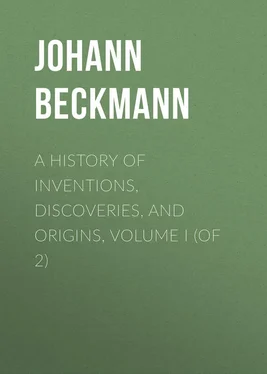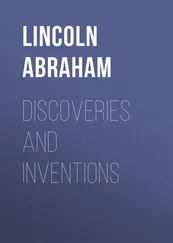Johann Beckmann - A History of Inventions, Discoveries, and Origins, Volume I (of 2)
Здесь есть возможность читать онлайн «Johann Beckmann - A History of Inventions, Discoveries, and Origins, Volume I (of 2)» — ознакомительный отрывок электронной книги совершенно бесплатно, а после прочтения отрывка купить полную версию. В некоторых случаях можно слушать аудио, скачать через торрент в формате fb2 и присутствует краткое содержание. Жанр: foreign_antique, foreign_prose, на английском языке. Описание произведения, (предисловие) а так же отзывы посетителей доступны на портале библиотеки ЛибКат.
- Название:A History of Inventions, Discoveries, and Origins, Volume I (of 2)
- Автор:
- Жанр:
- Год:неизвестен
- ISBN:нет данных
- Рейтинг книги:4 / 5. Голосов: 1
-
Избранное:Добавить в избранное
- Отзывы:
-
Ваша оценка:
- 80
- 1
- 2
- 3
- 4
- 5
A History of Inventions, Discoveries, and Origins, Volume I (of 2): краткое содержание, описание и аннотация
Предлагаем к чтению аннотацию, описание, краткое содержание или предисловие (зависит от того, что написал сам автор книги «A History of Inventions, Discoveries, and Origins, Volume I (of 2)»). Если вы не нашли необходимую информацию о книге — напишите в комментариях, мы постараемся отыскать её.
A History of Inventions, Discoveries, and Origins, Volume I (of 2) — читать онлайн ознакомительный отрывок
Ниже представлен текст книги, разбитый по страницам. Система сохранения места последней прочитанной страницы, позволяет с удобством читать онлайн бесплатно книгу «A History of Inventions, Discoveries, and Origins, Volume I (of 2)», без необходимости каждый раз заново искать на чём Вы остановились. Поставьте закладку, и сможете в любой момент перейти на страницу, на которой закончили чтение.
Интервал:
Закладка:
It is indispensably requisite at Göttingen that every professor should be able to give account of the progress and existing state of the science to which he is appointed. Any one, who two years after the publication of a work of importance in his department should not have read and analysed it, with a view of enriching his own observations, would not be regarded as a worthy successor to the chair of Haller, of Mosheim, of Gessner and Michaelis. Beckmann, who had studied at Göttingen at a time when the example of these great men dictated the law and gave the tone to the University, and perhaps to the literature of Europe, was determined to keep pace with the spirit of the age, and not to remain ignorant of the great advances then making throughout Europe, in the numerous sciences which furnished the subjects of his practical investigations. But this was a task of no slight magnitude: and indeed when the immense additions to so many different sciences are considered, can it be wondered at, that, notwithstanding his utmost zeal and application, he found it impossible to read up all the important works which had appeared since 1770, in chemistry, physics, natural history and mathematics? Despairing of success in so Herculean an undertaking, he began to entertain feelings of aversion towards what he deemed the innovations, which were then changing the face and enlarging the scope of science. But his course of lectures, turning principally on practical matters, was not materially affected; he was, however, so fearful of falling under the imputation of being behind the progress of the age, that he devoted his mind, peculiarly fitted for this kind of study, almost exclusively to the history of arts and trades; employing in the illustration of his subjects, the materials to which he had access in the very extensive library belonging to the university; and it is to his consequent labours and researches that we owe the “History of Inventions and Discoveries.” In this work, Beckmann traces their first germs from the remotest periods of antiquity, and following their gradual development, exhibits the latest improvements among civilized nations with almost unequalled acumen and ability. It abounds with invaluable materials respecting the general history of the origin and progress of the mechanic arts, which are so important a branch in civilization; and what must give it an additional value in the eyes of all who are unwilling to place reliance on assertions unsupported by authority, or may be anxious to investigate the subject more deeply, the most scrupulous references to original authorities accompany each article. Among the numerous other works of merit for which we are indebted to the literary industry of Beckmann, are, “A History and Analysis of early Voyages and Travels,” a highly interesting collection, which occupied the last years of his life, and was left unfinished at the eighth number; elaborate editions of “De Mirabilibus Auscultationibus,” attributed to Aristotle, 1786; “Antigoni Carystii Historiæ Mirabiles,” 1791; and “Marbodi Liber de Gemmis,” 1799; publications which required the rare combination of physical knowledge with philological learning.
The Royal Society of Göttingen had, in the year 1772, admitted him one of its members, and from that period to 1783 he continued to supply their proceedings with interesting memoirs (all written in Latin), among which are the following: “On the Reduction of Fossils to their original substances;” “On the History of Alum;” “On the Sap of Madder;” “On Meerschaum, from which are formed the heads for tobacco pipes;” “On the History of Sugar,” &c. After this period, however, he declined participating any longer in the labours of this learned body; owing, probably, to a change in the objects of his own particular studies. In 1784 he was created an aulic councillor of Hanover; in addition to which he was elected member of the Imperial Academy of Naturalists, of the Swedish Society of Science, of the Academies of Norway and Mayence, of the Physiographical Society of Lund, and of almost all the learned societies in Germany and the North of Europe.
With a copious knowledge of the principal sciences, Beckmann united extensive reading in the works of ancient and modern writers, not only in reference to their immediate connection with his main studies, but in respect also to their application generally to every other branch. Convinced that every professor ought, as much as possible, to have thoroughly searched into all matters relating to the subject on which he treats, he spared no expense in forming a most extensive, as well as choice library; at the same time he did not fail to avail himself of the rich intellectual stores contained in that belonging to the university. His mind being wholly directed to all that is practical in human knowledge, it was his especial endeavour to bring it into systematic rules, based upon fundamental principles. To him particularly is to be ascribed the merit of having been the first to give to agriculture its scientific form, and to have separated it more distinctly than heretofore from the administrative and financial departments. The number of pupils indebted to him for their education, and who, eventually, – whether filling offices of state or following his footsteps as professors, – brought into effect the principles he had taught them, formed a very numerous body; and whilst he was thus the means of considerably enlarging the circle of academic subjects for the instruction of the student, he contributed not a little towards the prosperity of the university itself. His activity likewise as a writer was as persevering as it was meritorious; he united an extensive knowledge of nature, with a decided turn for applying it to practical purposes; and he published several works in German, which show this tendency of mind; among others, “Principles of German Agriculture,” “Introduction to Technology,” “Introduction to the Science of Commerce,” &c.
To assist his literary researches, he issued a periodical work called “Physico-Œconomical Library,” in which quarterly information was communicated respecting the newest works connected with the arts, manufactures, and agriculture, giving short extracts of whatever was valuable, instead of severe criticisms, of which he did not approve. It was commenced in 1770, and continued, with some little interruption, until 1807, forming 23 volumes.
Having said thus much respecting his abilities and genius, we will in conclusion take a brief glance at his private character, which, amiable and virtuous as it was, cannot fail to command the world’s estimation. Honest and unpretending, a lover of peace and justice, he lived quite retired, devoted to the conscientious performance of his duties; his candour, his sincerity in friendship, his affability to the students, have been celebrated with one accord by his coadjutors and auditors. In the domestic relations of life, he presented an example of the most exact system of order and œconomy, and enjoyed the reputation of being one of the richest professors of the university; which enabled him to exercise his ready benevolence during a period of severe dearth and suffering. Among his colleagues, Schlœtzer, the distinguished historian, with whom in his youth he had become acquainted in Russia, was the one with whom he maintained the most uninterrupted intimacy, arising, no doubt, from the congeniality of their pursuits. Few were better qualified than Schlœtzer to appreciate the researches of Beckmann, as he had himself insisted with so much force on the necessity of introducing into history a simultaneous view of the influence exercised on social institutions by the efforts of industry, and the rise and maturity of domestic arts. Beckmann married the daughter of Hollmann, his tutor and friend, with whom he enjoyed a long and uninterrupted course of happiness; she survived him only a few weeks, leaving a son and daughter who had arrived at years of maturity. His decease took place on the 3rd of February, 1811, in the 72nd year of his age. His illustrious colleague, Heyne, pronounced an eloquent eulogium on him before the Academy, which was published in the Göttingen Transactions, from which we subjoin a few extracts.
Читать дальшеИнтервал:
Закладка:
Похожие книги на «A History of Inventions, Discoveries, and Origins, Volume I (of 2)»
Представляем Вашему вниманию похожие книги на «A History of Inventions, Discoveries, and Origins, Volume I (of 2)» списком для выбора. Мы отобрали схожую по названию и смыслу литературу в надежде предоставить читателям больше вариантов отыскать новые, интересные, ещё непрочитанные произведения.
Обсуждение, отзывы о книге «A History of Inventions, Discoveries, and Origins, Volume I (of 2)» и просто собственные мнения читателей. Оставьте ваши комментарии, напишите, что Вы думаете о произведении, его смысле или главных героях. Укажите что конкретно понравилось, а что нет, и почему Вы так считаете.












